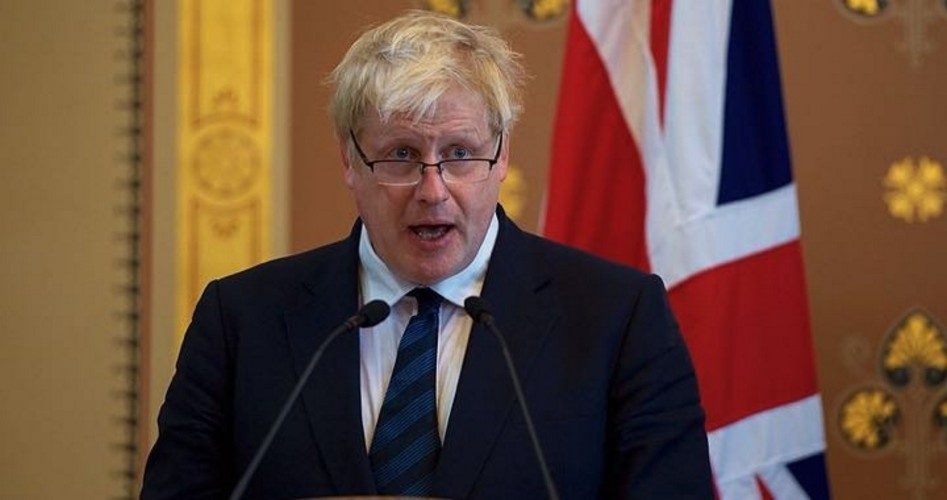
Hardline Brexiteer Boris Johnson took a huge step toward making his new residence Number 10 Downing Street on Thursday, as he breezed to a landslide victory in the first round of leadership elections for the Conservative (Tory) Party. Johnson secured 114 of 313 votes from Tory MPs who are tasked with electing a new leader to take over for Theresa May, who has failed to deliver Brexit.
Johnson easily outdistanced his closest rivals Jeremy Hunt (43 votes) and current Environment Secretary Michael Gove (37 votes.) Other dark horse candidates who moved forward in the balloting included former Brexit Secretary Dominic Raab (27 votes), Home Secretary Sajid Javid (23 votes), Health and Social Care Secretary Matt Hancock (20 votes), and International Development Secretary Rory Stewart (19 votes.)
The vote threshold to stay in the race was 17, which eliminated MPs Andrea Leadsom, Esther McVey, and Mark Harper from contention.
Hancock announced that he is withdrawing from consideration, which leaves six contenders left. He has yet to announce who he will throw his support behind.
Current PM Theresa May also voted but will not throw her support behind any of the candidates. When asked by a reporter who she voted for, she answered, testily, “That’s none of your business.”
MPs will continue to vote on remaining candidates until two are left. The next ballot is scheduled for Tuesday of next week, with the threshold being 33 votes to move forward. In the unlikely event that all candidates meet that threshold, the candidate with the lowest number of votes will be eliminated. Votes will be held on successive days until the number of candidates left is two.
“Thank you to my friends and colleagues in the Conservative and Unionist Party for your support. I am delighted to win the first ballot, but we have a long way to go,” Johnson tweeted in reaction to the vote.
Johnson, the former mayor of London and the secretary of state for Commonwealth Affairs under Theresa May, has been a hardline Brexiteer throughout the process. Johnson resigned from May’s Cabinet last year after her Chequers Plan for leaving the EU was announced. Johnson believed that the plan tied the U.K. far too closely with the EU.
In his resignation letter, Johnson accused May of betraying the British citizens by offering a withdrawal deal that would leave the U.K. “locked in the EU system,” but with no U.K. control over that system. “Brexit should be about opportunity and hope. It should be a chance to do things differently, to be more nimble and dynamic, and to maximize the UK as an open, outward-outward looking global economy,” Johnson wrote.
Johnson has promised that, if selected as prime minister, May’s deal would be officially dead. Johnson has said he would either negotiate a better deal with the EU or leave with no deal on World Trade Organization terms. Either way, Johnson believes that the October 31 “leave” date is a firm date. “After three years and two missed deadlines, we must leave,” Johnson has said.
President Trump, who hasn’t endorsed a candidate, shared a phone call with Johnson during his visit to the U.K. in early June, but a planned meeting did not come off. Johnson has been compared to Trump because of his plainspoken, non-politically correct way of communicating.
“Occasionally, some plaster comes off the ceiling as a result of a phrase I may have used,” Johnson said recently. “The public wants us to talk straight and say what we really think.”
Second-place finisher Jeremy Hunt was a supporter of remaining in the EU during the 2016 referendum. Hunt was a strong supporter of May’s withdrawal deal, though he has said that the U.K. would “flourish and prosper” even without a deal.
“Delighted to come in second today. We face a crucial choice: who can negotiate some better choices than the bad ones we face. The stakes have rarely been higher for our country. This serious moment calls for a serious leader,” Hunt wrote on Twitter.
British oddsmakers have listed Johnson as a 5:1 favorite to be the next prime minister, with Hunt coming in second at 7:1.
Whoever wins the Tory leadership battle may have a short reign as prime minister, as some in the party fear a Labour Party revolt over the possibility that a no-deal Brexit may ignite a no-confidence vote and the possibility of a General Snap Election. Were that to happen, the Tories would have not only the Labour Party to worry about but also Nigel Farage’s new Brexit Party, which won a huge victory in May’s European Parliament election.
Photo of Boris Johnson: U.S. Department of State



